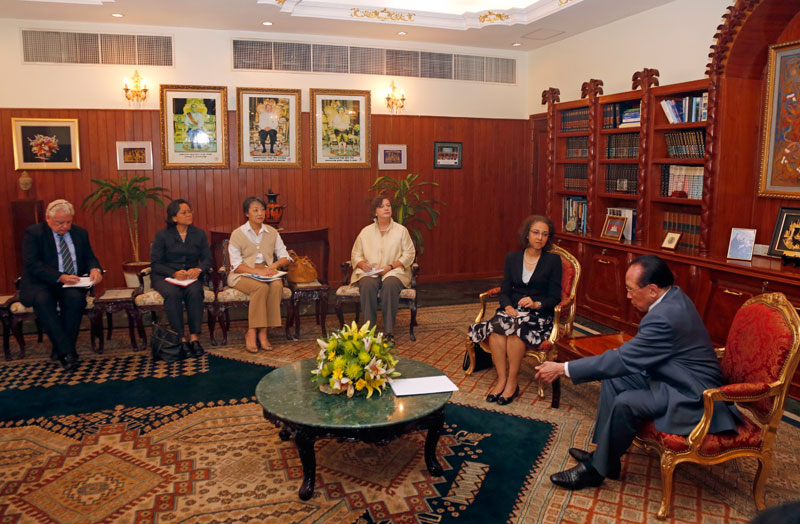Foreign Affairs Minister Hor Namhong on Thursday took the U.N. to task over a recent letter four of its senior country officials wrote criticizing the government’s secretive drafting of a controversial NGO law, a day after the ministry called the U.S. ambassador’s remarks on the same issue “insolent.”
Local and international NGOs alike are staunchly opposed to the last public draft of the law—now more than three years old—which would require them to register and file annual activity and financial reports with the government.

After Prime Minister Hun Sen said last month that he wanted to see the law passed by the end of May, more than 300 NGOs and associations signed a petition urging the government to release its latest draft and hold more consultations with them before a vote. Their main concern is that the draft’s failure to lay out a clear and concise list of reasons the government could refuse registration will be misused to silence critical voices.
In a letter published in a local newspaper last week, the heads of four of the U.N.’s agencies in the country—Unicef, UN Women, UN Population Fund and the UN’s Office of the High Commissioner for Human Rights (UNOHCHR)—said the government was not doing enough to involve the public in the drafting process.
They asked the government that the most up-to-date version of the draft “be shared as soon as possible, that genuine consultations on it be conducted and the recommendations genuinely considered prior to its finalization.”
The government last consulted with NGOs on the draft in late 2011 and has thus far ignored calls to meet with them again.
On Thursday morning, Foreign Affairs Minister Hor Namhong called the four authors, as well as U.N resident coordinator Claire Van der Vaeren, to a meeting at his office to express his displeasure with their letter in person.
“I told them that as representatives of U.N. organizations, they must respect Article 2 of the U.N. Charter,” the minister told reporters following the closed-door meeting.
The Charter states that no article authorizes the U.N. to intervene in the domestic affairs of any state.
“So your comments in your capacity as U.N. agencies are going beyond the U.N. Charter,” the ministry said in a statement, also released Thursday. In the future, the U.N. representatives should send their remarks to the appropriate government body, it added, “instead of publish your comment/criticism in the media.”
Asked for comment, the UNOHCHR referred a reporter to a post on its Facebook page, which called the meeting “frank and cordial.”
“The [U.N.] agency heads reaffirmed that they were acting within their mandates and reiterated their offer of support for dialogue with civil society on this important law,” it said.
On Wednesday, the Foreign Affairs Ministry also rebuked U.S. Ambassador William Todd for making similar comments about the NGO law in his latest weekly column, published on a local news website. In a statement, it called the ambassador’s remarks “extremely insolent.”
At Thursday’s press conference, Mr. Namhong defended the need for the law as a vital bulwark against the risks of terrorist financing seeping into the country through unscrupulous NGOs.
“Nowadays, we don’t know who does what or where they go around Cambodia,” he said. “What if some day something happens under the name of civil society, and some NGOs commit terrorism or extremist acts? Who will be responsible? That is why we have to ask.”
NGOs say the country already has the laws it needs to have registered organizations audited and counter such risks.
Council of Ministers spokesman Phay Siphan said the Council could vote on the draft law on May 29, clearing its path to the National Assembly, where CPP lawmakers could use their majority to pass it into law.
(Additional reporting by Zsombor Peter)



